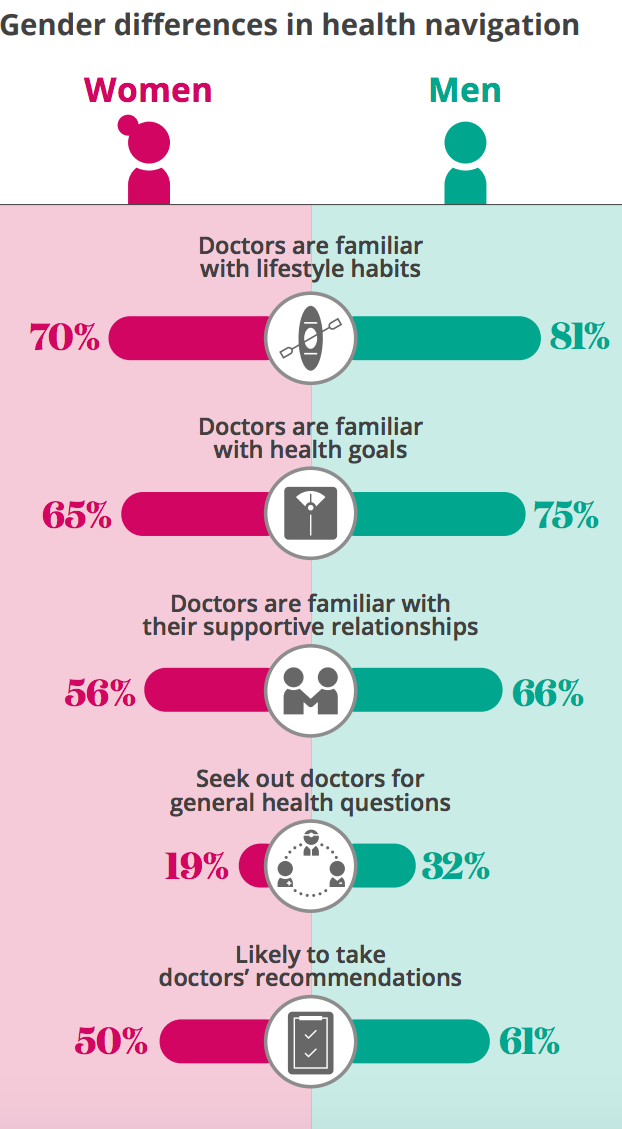Health Ambitions Study Reveals Women Are Not Connecting with Their Doctors
Based on the inaugural Health Ambitions Study by Aetna, females are more likely to be disconnected from their doctor than men. Here are some considerations in bridging the gap between the healthcare provider and these patient populations.

Women consistently report less satisfaction with their healthcare providers - Infographic courtesy of Aetna's inaugural Health Ambitions Study
Results of Aetna’s inaugural Health Ambitions Study show that patients, in particular women, are more concerned than ever about their overall holistic health and are focused on resolving issues, such as stress, to focus extra time on activities that promote mental wellbeing.
Despite ambitious health goals, women consistently report less satisfaction with their healthcare providers. Only 50 percent of women say they are likely to take the recommendations of their doctor and only 70 percent say their doctors are aware of their lifestyle habits. This opposes male respondents who answered at 61 and 81 percent respectively — over a 10 percent increase compared to female respondents in each sector.
Staggering statistics like these leave the dental provider wondering what they can do to increase patient satisfaction and compliance. “It would be beneficial for dental providers to be more in tune with patient’s health goals as most people see their dentists more often than their medical providers” said Michelle Neuman, RDH, Senior Director of Dental Management at Aetna.
Improving mental wellbeing, convenient access to appointments and a cohesive connection between healthcare providers for continued care are some of the most important aspects of the patient experience, according to the study; and all aspects are easy to control for in the dental setting.
Grappling with Mental Health
The majority of female respondents in the study have either stress reduction or mental health goals on their list of priorities yet not all patients disclose their complete mental health to their dental care provider. Making sure patients fill out a comprehensive medical history form and addressing their conditions without judgement is important for connecting with them. “Certain triggers in the office [could] create potential risks not only for the patient but the staff as well” said Neuman, adding “It will still be up to the patient to disclose their mental health history.”
Mental health conditions, such as Bulimia Nervosa, can lead to oral manifestations of disease; but some issues may be subtler. Dental care providers are encouraged to further educate themselves in the detection of behavioral health issues. By reaching out to a patient in need, a clinician can show that they care about the patient’s comfort and reduce the barriers to a genuine connection.
Cater to Patient Schedules
There are other ways to appeal to the patient’s busy schedule besides offering early morning and late-night appointments. The term “Sandwich Generation” is used to describe women that provide care to both their offspring and dependent parents. They are often seen at doctor’s appointments but are rarely there for themselves. Caregivers who frequently neglect their own needs are often left waiting in the front office while their children or parents receive cleanings and fillings.
Instead of wasting idle time, it’s important to prioritize the needs of both patients so as to optimize both their time and that of the office. In a dental office with one hygiene schedule, it might be worthwhile to incorporate one or two days per month where there are two hygienists working side by side. Caregivers of disabled parents or children can cross two appointments off their list at one time without needing to neglect anyone’s priority.
Develop a Great Referral Network
Patients loathe the possibility of being referred to a specialist, especially in an emergency situation. It incurs high costs and lost time in addition to being unfamiliar territory. Developing good relationships with specialists is as much for the patients benefits as it is for the dentist. A confident referral and the knowledge that there will be collaboration between the specialist and general dentist can help settle their nerves. Plus, a call made directly by the front office staff to the specialist is more likely to result in an immediate appointment — a tangible benefit and relief to the patient.
The modern stressors associate with today’s lifestyle make it difficult for patients to connect with their dentists. Making the needs of the patient a priority will bridge the gap between the patient and their healthcare providers. Dentist’s need to utilize a little intuition coupled with great customer care to keep their patients returning.
Click here to sign up for more Dentist's Money Digest content and updates.RELATED:
More Coverage on
- New Guide May Help Your Young Patients Conquer Dental Fear
- Genes Might Be to Blame for Fear of the Dentist
- Women Expect, Tolerate More Pain at the Dentist